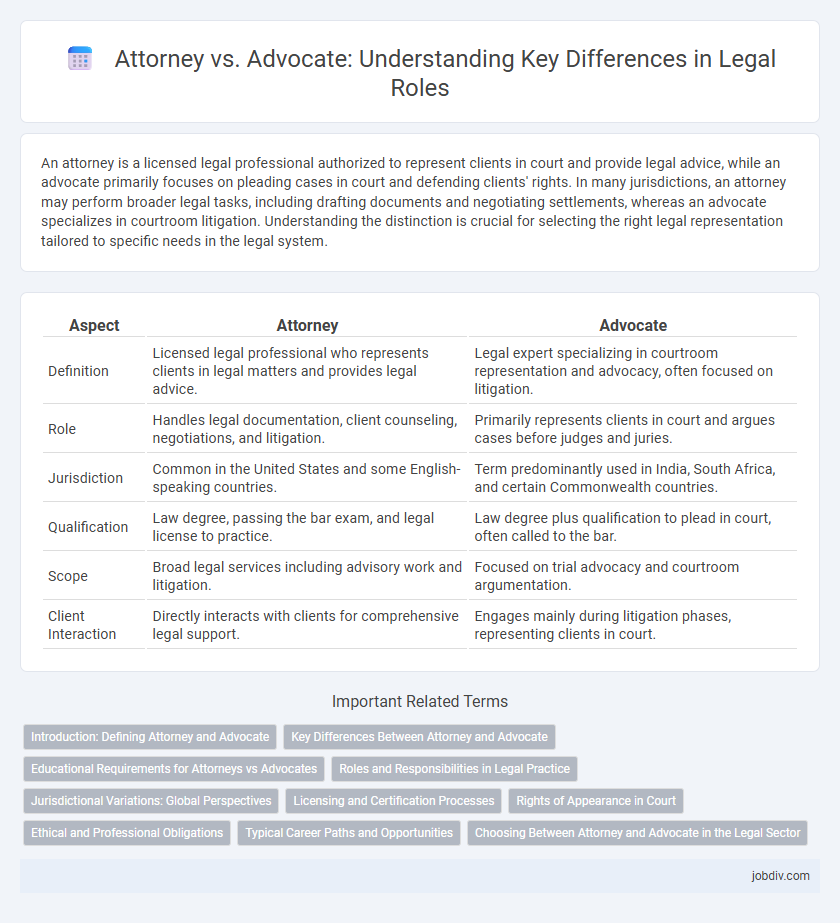An attorney is a licensed legal professional authorized to represent clients in court and provide legal advice, while an advocate primarily focuses on pleading cases in court and defending clients' rights. In many jurisdictions, an attorney may perform broader legal tasks, including drafting documents and negotiating settlements, whereas an advocate specializes in courtroom litigation. Understanding the distinction is crucial for selecting the right legal representation tailored to specific needs in the legal system.
Table of Comparison
| Aspect | Attorney | Advocate |
|---|---|---|
| Definition | Licensed legal professional who represents clients in legal matters and provides legal advice. | Legal expert specializing in courtroom representation and advocacy, often focused on litigation. |
| Role | Handles legal documentation, client counseling, negotiations, and litigation. | Primarily represents clients in court and argues cases before judges and juries. |
| Jurisdiction | Common in the United States and some English-speaking countries. | Term predominantly used in India, South Africa, and certain Commonwealth countries. |
| Qualification | Law degree, passing the bar exam, and legal license to practice. | Law degree plus qualification to plead in court, often called to the bar. |
| Scope | Broad legal services including advisory work and litigation. | Focused on trial advocacy and courtroom argumentation. |
| Client Interaction | Directly interacts with clients for comprehensive legal support. | Engages mainly during litigation phases, representing clients in court. |
Introduction: Defining Attorney and Advocate
An attorney is a legally qualified professional licensed to practice law, represent clients, and provide legal advice in courts. An advocate specifically refers to a lawyer who pleads cases in higher courts and represents clients during litigation. Both roles require legal education, but attorneys often handle broader legal responsibilities beyond courtroom representation.
Key Differences Between Attorney and Advocate
An attorney is a licensed legal professional authorized to represent clients in legal matters, draft legal documents, and provide legal advice, whereas an advocate primarily represents clients in court proceedings and focuses on litigation. Attorneys often engage in a wider range of legal services including consultation and transaction handling, while advocates specialize in courtroom advocacy and argumentation. The key difference lies in the scope of practice, with attorneys having broader legal responsibilities and advocates concentrating on trial advocacy and litigation expertise.
Educational Requirements for Attorneys vs Advocates
Attorneys must complete a Juris Doctor (JD) degree from an accredited law school, followed by passing the state bar examination to practice law officially. Advocates often require similar legal education but may also need specialized training in courtroom advocacy and litigation techniques depending on the jurisdiction. Educational requirements for attorneys emphasize comprehensive legal knowledge, while advocates focus more on practical skills related to representing clients in court.
Roles and Responsibilities in Legal Practice
Attorneys primarily represent clients in legal matters, providing counsel, drafting documents, and appearing in court to advocate for their clients' interests. Advocates specialize in courtroom litigation, presenting cases before judges and juries while emphasizing persuasive argumentation and legal strategy. Both roles require in-depth knowledge of law, but attorneys often handle broader legal services including negotiations and transactional work.
Jurisdictional Variations: Global Perspectives
Attorney and advocate roles vary significantly across jurisdictions, with attorneys primarily representing clients in legal matters in the United States, while advocates hold similar responsibilities in countries like India and South Africa, where the legal systems distinguish between litigation and advisory roles. In common law jurisdictions, attorneys often combine both client counseling and courtroom representation, whereas advocates tend to specialize exclusively in courtroom advocacy and are typically briefed by attorneys. Understanding these jurisdictional variations is essential for cross-border legal practice and effective client representation in international law.
Licensing and Certification Processes
Attorneys undergo a rigorous licensing process that includes passing the state bar exam and fulfilling specific educational requirements such as obtaining a Juris Doctor degree from an accredited law school. Advocates, particularly in jurisdictions like India, must also pass the bar examination and enroll with the Bar Council to gain certification, allowing them to practice law and represent clients in court. Both roles require continuous legal education and adherence to professional ethics to maintain their licenses and certifications.
Rights of Appearance in Court
Attorneys have the legal right to represent clients and appear in all levels of court, including trial and appellate courts, ensuring full advocacy on behalf of their clients. Advocates primarily specialize in courtroom litigation and often hold specialized rights of audience in higher courts, such as High Courts and Supreme Courts, depending on jurisdiction. The distinction in rights of appearance directly affects case strategy and legal representation capabilities in complex litigation matters.
Ethical and Professional Obligations
Attorneys and advocates both uphold strict ethical standards, including client confidentiality, conflict of interest avoidance, and maintaining integrity in legal proceedings. Attorneys are bound by comprehensive professional codes like the ABA Model Rules of Professional Conduct, which govern their responsibilities across various legal services. Advocates must ensure impartial representation while adhering to courtroom decorum and advocating zealously within the bounds of the law to protect their clients' interests.
Typical Career Paths and Opportunities
Attorneys often pursue careers in corporate law, government agencies, or private practice, specializing in contract negotiation, litigation, or compliance. Advocates typically focus on courtroom representation and may advance by joining bar councils, working as public prosecutors, or becoming senior advocates in higher courts. Both career paths offer opportunities in legal consulting, academia, and specialized fields such as intellectual property or environmental law.
Choosing Between Attorney and Advocate in the Legal Sector
Choosing between an attorney and an advocate depends on the legal system and the specific services required. Attorneys typically provide legal advice, prepare documents, and may represent clients in lower courts, while advocates specialize in courtroom litigation and often appear in higher courts. Understanding the jurisdictional roles and expertise of attorneys and advocates ensures the selection of the most suitable legal professional for effective representation.
Attorney vs Advocate Infographic

 jobdiv.com
jobdiv.com